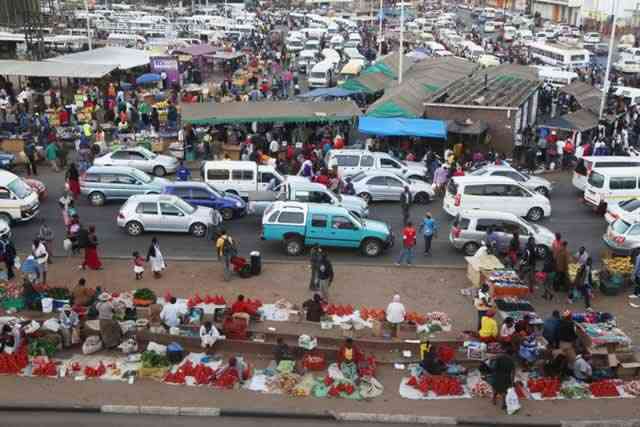
The first ever International Street Vendors Day was celebrated across the world on the November 14, 2012.
The day spotlights the significant contribution street vendors make towards their local economies.
It is a time to venerate the centrality of street vending to world economies and an opportunity for vendors to reflect on their challenges, achievements and opportunities.
The day was first celebrated under the banner of StreetNet International.
StreetNet International is a global organization of committed informal traders, with the goal to promote and leverage an autonomous and democratic alliance of street vendors, hawkers, and cross-border traders in over 50 countries.
The day calls for recognition of the contribution street vendors make to national development and to raise awareness on the significant challenges street vendors face.
Eleven years since the day was first celebrated, street vendors still face considerable challenges in going about trying to earn a decent living.
In Zimbabwe, this year’s commemorations are taking place at the backdrop of the declaration of war on street vendor’s livelihoods by the authorities, characteristic of their arrests, confiscation of goods, detentions, prosecutions, and assaults which has decimated the vendors’ capacities to trade profitably, and taken a toll on their livelihoods and those of their families.
- Mavhunga puts DeMbare into Chibuku quarterfinals
- Bulls to charge into Zimbabwe gold stocks
- Ndiraya concerned as goals dry up
- Letters: How solar power is transforming African farms
Keep Reading
Street vending has been seen as a nuisance by many local municipalities in Zimbabwe and their right to earn decent livelihoods is always under threat by unfavorable by-laws and municipal regulations.
Urban policies and local economic development strategies rarely prioritize livelihood security (social protection) for informal workers.
Urban renewal projects and infrastructure upgrades routinely displace street vendors from natural markets, leaving the most vulnerable without a suitable workplace.
However, good practice documentation shows street vendors can help with urban management challenges like crime and cleaning.
Also, basic infrastructure, shelter, toilets, electricity and water can improve work environments and make public spaces safer, more comfortable and aesthetically pleasing.
Some cities in the so-called developed world are working with street vendors’ organizations to formulate innovative policies, programmes and practices that enable street vendors to have a voice in making their cities more inclusive.
The Vendors Initiative for Social and Economic Transformation (Viset) functions as a solidarity, resource and information center for street vendors whose constitutional rights to livelihoods, decent work and social security are constrained due to unfavourable policies and engage with local councils in addressing these challenges.
Over the past eight years of its existence, Viset has developed alternative approaches to the management of street vendors and shared the same with authorities for adoption and possible implementation.
Viset believes that while the government has a responsibility to decongest the cities and confine street vending to designated sites, this has to be done in a manner that does not impinge on street vendors right to livelihoods.
In India and South Africa, the street ending challenge was overcome amicably without necessarily arresting or prosecuting street vendors and we implore the government of Zimbabwe and local authorities to embrace the same progressive approach.
As the world celebrates the international street vendors’ day, it must also be an opportunity to let the authorities know that street vendors are small businesses that, if granted adequate and appropriate support, such as access to finance, profitable markets, skills development, can actually grow their businesses and become macro-entrepreneurs and create employment for young people.
The number of street vendors flocking to central business districts (CBD) to search for livelihoods continues to swell.
In Harare CBD for instance, there is an estimated 50 000 street vendors.
While this number continues to increase, vending space does not increase.
This has resulted in vendors occupying pavements; entrance’s to shops, and other unorthodox places thus exposing cities to health and other hazards.
Whilst there are some peculiar challenges to the trade, on the whole street vendors face similar challenges in plying their trade on the African continent and globally.
Street trading is thriving and growing in harsh economic times, so we can no longer overlook that street vendors are an integral part of urban economies around the world, offering easy access to a wide range of goods and services in public spaces.
It should be acknowledged that street trading is an ancient and important occupation found in virtually every country and major city around the world.
Most of these challenges arise from the historical fact that most African countries have not transformed statutes on their books that pre date attainment of independence, such as municipal by laws that criminalize informal work.
Law enforcement authorities and municipalities have often regarded street vending as being a part of an underground economy which hinders operations of the formal economy and this has led to clashes over market space, licensing and sanitation.
It is unfortunate that, even where local authorities collect substantial amounts of revenue through operating fees, no proper records are kept in order for them to respond to the needs of the sector.
Besides the regulation challenges, street vending is at times adversely affected by low purchasing power of customers, poor location of market space, lack of formal financing schemes and unreliability of credit customers.
The profile of the average street vendor is changing as well, with most university graduates also turning to the trade due to limited employment opportunities.
There is also a more affluent type of street vendor that now operates from car boots, as well as using social media and uses air travel to purchase wares from destinations such as Dubai, Turkey and China.
At present, it is estimated that across the continent, the informal sector accounts for over 65% of employment, with street vending providing much of that number.
It is thus imperative for national and local governments to begin to respect and respond to the needs of the informal sector.
In Zimbabwe, the right to carry on trade or business is provided for under Section 64 of the constitution which provides for the right to freedom of choice and practice of a trade or profession.
Section 24 of the constitution provides for the national objective of removing restrictions that inhibit people from working or otherwise engaging in gainful economic activities.
Section 13 of the constitution obliges the government to promote private initiatives and self-reliance.
The right to human dignity, right to food and right to life can all not be realized if people are denied opportunities to earn livelihoods.
Street vendors provide valuable services to the urban population while trying to earn a livelihood and it is the duty of the State to protect the right of this segment of population to earn their livelihood.
- Samuel Wadzai is an informal economy analyst and Viset executive director. He writes in his personal capacity.
- These weekly articles are coordinated by Lovemore Kadenge, an independent consultant, managing consultant of Zawale Consultant (Private) Limited, past president of the Zimbabwe Economics Society and past president of the Chartered Governance & Accountancy Institute in Zimbabwe. Email - kadenge.zes@gmail.com or Mobile No. +263 772 382 852










